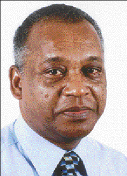
Tonny BeccaAFTER years of pleading and begging, cricketers may soon have their wish. Cricket, it appears, has seen the light. It is now ready to introduce "neutral" umpires.
According to Lord MacLaurin, the chairman of the England and Wales Cricket Board who is on his way to Sri Lanka to make peace between the two teams following a breakdown in behaviour over umpiring decisions, the time has come for neither of the two umpires in a match to come from either of the teams involved, and according to the honourable Pat Rousseau, president of the West Indies Cricket Board, the ICC is moving in that direction.
"Oh, yes," said Rousseau yesterday. "It has been discussed, there are just a few things to finalise, and it should be on stream by June or July."
The main thing to be finalised is the number of umpires on the panel.
The ICC's recommendation calls for a panel of the top eight umpires from which two will be selected for each match. There is a fear, however, that such a panel would be dominated by a country like England, and on the table is a suggestion that the panel should comprise 14 umpires - the best one from each of the 10 Test-playing countries and then the best four.
Whatever the final decision as far as the number on the panel is concerned, "neutral" umpires is good news for the players, many of whom, along with some journalists and administrators, have been calling for it for some time now - certainly since the World Cup of 1987.
As good as a batsman or a bowler is, his fate, his success, is often times determined by one man - and so too can the result of a match. The umpire is that one man, for the simple reason that his decision, right or wrong, is final.
The umpire, however, is not perfect, and like all men, he makes mistakes.
The call for "neutral" umpires, however, has nothing to do with mistakes: it is simply because there are players and fans who believe that on a number of occasions, the mistakes are not really mistakes but rather home town decisions.
Will the introduction of two "neutral" umpires prevent mistakes? Not necessarily. As happens now with the one "neutral" umpire, mistakes will always be made, and the presence of two would only remove the charge, the complaints, of home town bias when decisions go against the visiting team.
If the idea, however, is to really cut down on the number of mistakes, then apart from training and testing umpires regularly, the thing to do, again as so many have been suggesting for some time now, and as the Sri Lankan Board did a few days ago, is to allow the umpires to call on the third umpire more often.
Apart from determining where the ball pitches, the use of the television camera may not be ideal for leg before wicket decisions. It would, however, for example, be invaluable to the umpire in deciding bat-pad catches.





































